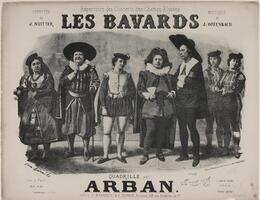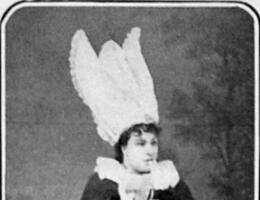Les Bavards
Opéra bouffe premiered at Bad Ems on 11 June 1862 (one-act version entitled Bavard et Bavarde) and performed for the first time in the new two-act version with its definitive title on 20 February 1863 at the Théâtre des Bouffes-Parisiens.
Composed to a libretto by Charles Nuitter taken from Los habladores by Cervantes, Les Bavards charts the trials and tribulations of young Roland, a penniless poet who is trying to escape from his creditors. Taking shelter in front of the house belonging to Sarmiento, a wealthy man kept busy counting his money, Roland falls under the spell of his niece, Inès. This marks the start of a series of romantic misadventures with a Spanish flavour which call to mind certain passages from Les Brigands. Hounded by his creditors, Roland hides and puts on a disguise. As is often the case with comic operas, there is a double action plot and the couple’s adventures involve four people. Roland’s arrival gives Sarmiento the chance to settle some scores with his wife Béatrice, an inveterate chatterbox whom he is thrilled to reduce to silence with Roland’s help. Everything ends happily when Roland marries Inès and Sarmiento, forced to pay off Roland’s debts, is pleased to learn that his wife has not been unfaithful to him as he had been given to believe. On the surface a light-hearted comedy of manners, Les Bavards also reveals a vein which is somewhat irreverent towards the Empress Eugénie, a native of Spain. The storyline is nevertheless highly conducive to the use of local colour, both in the music and in the colourful stage sets and costumes, which delighted the audience at the premiere. Described by Camille Saint-Saëns as a “genuine little masterpiece”, Les Bavards was a great success, even though it only lasted two months at the Bouffes-Parisiens.


